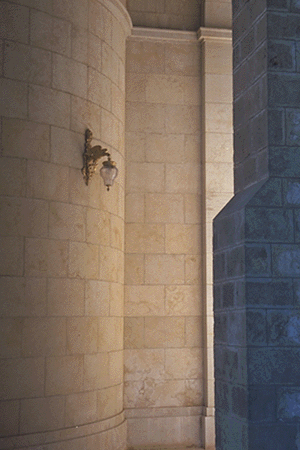
The wall of the Shrine of the Báb

Bahá'í theology and theophanology very much influence and shape the Bahá'í pilgrimage experience. A discussion of Bahá'í pilgrimage which makes no reference to how Bahá'ís relate to God is ipso facto incomplete. God, Bahá'u'lláh says, is ``sanctified above all attributes and holy above all names.'' [18] Humanity thus requires an intermediary, a prophet, to reveal the will of God. Bahá'ís use the term Manifestation of God to refer to these intermediaries.[19]
Every one of these Manifestations of God, Bahá'u'lláh says, has two stations: ``the station of pure abstraction and essential unity,'' and ``the station of distinction.''[20][21] In the latter station, they are distinct servants of God. In the former station, they are all identically the Manifestation of God:
Were any of the all-embracing Manifestations of God to declare; ``I am God,'' He, verily speaketh the truth, and no doubt attacheth thereto. For it hath been repeatedly demonstrated that through their Revelation, their attributes and names, the Revelation of God, His names and His attributes , are made manifest in the world....And were they all to proclaim , ``I am the Seal of the Prophets,''they, verily, utter but the truth, beyond the faintest shadow of doubt. For they are all but one person, one soul, one spirit, one being, one revelation. They are all the manifestation of the ``Beginning'' and the ``End,'' the ``First'' and the ``Last,'' the ``Seen'' and the ``Hidden'' -- all of which pertain to Him Who is the Innermost Spirit of Spirits and Eternal Essence of Essences. And were they to say, ``We are the Servants of God,'' this also is a manifest and indisputable fact. For they have been made manifest in the uttermost state of servitude, a servitude the like of which no man can possibly attain.[22]
Pilgrimage thus assumes a special significance for the Bahá'í. Pilgrimage to the abode of the Manifestation of God is almost like pilgrimage to the abode of God. To the Bahá'í, praying to the Manifestation of God is equivalent, in a sense, to praying to God. Obedience to the Manifestation of God is obedience to God. Bahá'ís thus have a very special place in their hearts for the great Manifestations of God. They love Bahá'u'lláh almost in the same way that they love God. This is why sites associated with Bahá'u'lláh are so special to Bahá'ís.
Variations in the way Bahá'ís relate to Bahá'u'lláh obviously lead to variations in the way in which Bahá'ís perceive the Holy Land and the Bahá'í Holy Places. The pilgrimage experience is subjective. Not only is each Bahá'í an individual who responds to God and religion in a unique way, but the absence of any clergy in the Bahá'í religion encourages the pilgrim to respond in an unfettered way to numinous stimuli. Each pilgrimage is bound to be different.
In view of the subjective nature of the pilgrimage experience, it may be of some benefit to the reader for this author to share his recollections of his pilgrimage. In July 1992 the author, then aged twenty-two, went on pilgrimage to the Holy Land. The Bahá'í community was then commemorating the one hundredth anniversary of Bahá'u'lláh's ascension, and 1992-3 was proclaimed a Bahá'í Holy Year. Going on pilgrimage during the Holy Year was an inestimable privilege in the eyes if this author, and I will never forget those blessed days of my life. In anticipation of my pilgrimage, I had memorized the Tablet of Visitation (see appendix) and was able to recite it by heart at the Shrine of the Báb and the Shrine of Bahá'u'lláh. I spent quite a bit of time there praying. I put a special effort not to ask God to fulfill my personal wishes, but instead I asked God to do with me as He pleased, and to allow me to live a life of service and sacrifice. Not only were those nine days in Israel some of the happiest in my entire life, but I believe that my character took a change for the better as a result of my pilgrimage. It was an eschatological event in my life, whose significance I am yet to understand in its full measure.
The mystical purpose of pilgrimage is to evoke in the individual a spiritual response. It is an opportunity for the individual to find new motivation in living a pure, holy life dedicated to God. `Abdu'l-Bahá explains,
Holy places are undoubtedly centres of the outpouring of Divine grace, because on entering the illumined sites associated with martyrs and holy souls, and by observing reverence, both physical and spiritual, one's heart is moved with great tenderness.[23]
Next: Bahá'í Holy Places
Up:
Bahá'í
Pilgrimage to Israel
Previous: Bahá'í Pilgrimage